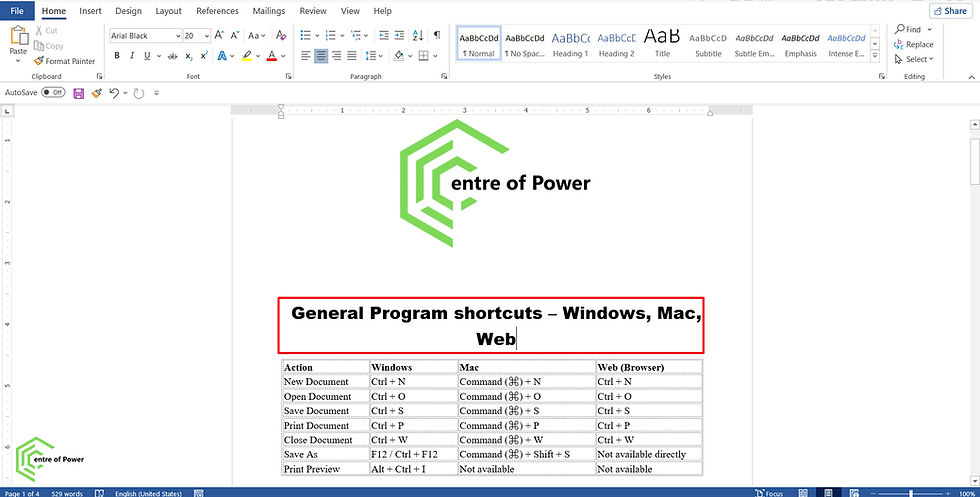MS Word: General Program shortcuts – Windows, Mac, Web
- Fakhriddinbek

- 25 сент. 2025 г.
- 4 мин. чтения
In today’s fast-paced digital world, efficiency is power. Whether you're drafting reports, writing proposals, or creating content, mastering keyboard shortcuts in Microsoft Word can dramatically boost your productivity.
This guide focuses on general program shortcuts—the essential commands for opening, saving, printing, and managing documents. And to make it even more useful, we’ve broken it down by platform: Windows, Mac, and Web.

Why Use MS Word: General Program shortcuts – Windows, Mac, Web?
Keyboard shortcuts are like secret weapons. They:
Save time by reducing mouse clicks
Keep your hands on the keyboard
Help you stay focused and in flow
Minimize repetitive strain from constant mouse use
Make you look like a tech-savvy pro in front of colleagues
Whether you're a student, entrepreneur, or corporate professional, these shortcuts are your gateway to working smarter.
Microsoft Word General Program Shortcuts: Platform Comparison
Here’s a handy table comparing the most useful MS Word: General Program shortcuts – Windows, Mac, Web:
Action | Windows | Mac | Web (Browser) |
New Document | Ctrl + N | Command (⌘) + N | Ctrl + N |
Open Document | Ctrl + O | Command (⌘) + O | Ctrl + O |
Save Document | Ctrl + S | Command (⌘) + S | Ctrl + S |
Print Document | Ctrl + P | Command (⌘) + P | Ctrl + P |
Close Document | Ctrl + W | Command (⌘) + W | Ctrl + W |
Save As | F12 / Ctrl + F12 | Command (⌘) + Shift + S | Not available directly |
Print Preview | Alt + Ctrl + I | Not available | Not available |
Note: Some shortcuts may vary slightly depending on browser or system settings. Always test them in your environment.
Shortcut Workflow Example
Try this quick routine:
Ctrl + N – Start a new document
Ctrl + S – Save immediately
Ctrl + P – Print when ready
Ctrl + W – Close and move on
Repeat this daily and watch your workflow transform.
Platform-Specific Tips
Windows Users
Windows users benefit from a wide range of shortcuts, including advanced ones like:
Ctrl + F12: Save As dialog
Alt + Ctrl + I: Print Preview
Ctrl + F: Find text quickly
These shortcuts are deeply integrated into the Windows ecosystem, making them fast and reliable.
Mac Users
Mac shortcuts use the Command (⌘) key instead of Ctrl. Mac users often find the shortcuts more intuitive due to consistent design across macOS apps. For example:
Command + Shift + S: Save As
Command + W: Close window
Web Users
Microsoft Word for Web is streamlined but still powerful. While some shortcuts are limited, the basics like Ctrl + S, Ctrl + P, and Ctrl + O work seamlessly across browsers.
Common Mistakes to Avoid
Even experienced users make these errors:
Not saving frequently: Use Ctrl + S often to avoid data loss.
Using mouse for everything: It slows you down.
Ignoring platform differences: Mac and Windows shortcuts aren’t always the same.
Bonus: How to Learn Shortcuts Faster
Here are some tips to memorize and master shortcuts:
Practice daily: Use shortcuts every time you work in Word.
Print a cheat sheet: Keep it near your workspace.
Use sticky notes: Place reminders on your monitor.
Teach others: Explaining shortcuts helps reinforce your memory.
Real-World Use Cases
Office Professionals
Imagine you're preparing a report for a meeting. Instead of clicking through menus, you use:
Ctrl + N to start
Ctrl + S to save regularly
Ctrl + P to print before the meeting
You finish faster and with fewer errors.
Students
Writing essays or assignments becomes smoother with shortcuts. You can:
Open previous drafts with Ctrl + O
Save versions with Ctrl + F12
Print final copies with Ctrl + P
Freelancers & Writers
Time is money. Shortcuts help you:
Switch between documents quickly
Save work instantly
Avoid distractions from mouse navigation
FAQs About Word Shortcuts
Q: Can I customize shortcuts in Word?
Yes! Go to File > Options > Customize Ribbon > Keyboard Shortcuts to assign your own.
Q: Do shortcuts work in all versions of Word?
Most do, but some advanced ones may vary between desktop and web versions.
Q: What if a shortcut doesn’t work?
Check your keyboard layout, language settings, or if another app is overriding the shortcut.
Real Productivity Gains
Let’s say you save 5 seconds every time you use a shortcut instead of a mouse. If you use 100 shortcuts a day, that’s 500 seconds saved — over 8 minutes daily, or 40 hours a year!
That’s a full workweek saved just by using shortcuts.
Ready to Power Up Your Productivity?
If this guide helped you, there’s more where that came from! At our website, we’re dedicated to helping you master office skills and unlock your full potential.
Subscribe to our newsletter for weekly tips and tutorials
Bookmark this page for quick reference
Share this article with your team or friends
Explore our productivity hub for more guides like this



Комментарии